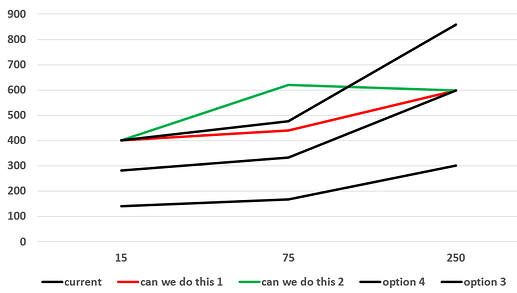As discussed in the thread started in Aligning on 1Hive direction. This new post will address the topic of updating the CV settings to increase proposal difficulty.
Thanks to the TEC community we have an awesome tool that allows us to play around with these parameters. I encourage everyone to give it a try at the Common Dashboard. In our case, we are only interested in the last step of the dashboard where the Conviction Voting is configured.
A few guidelines that many will find useful when thinking about Conviction Voting settings. First, we have two values that we can consider constant for our exercise:
- Common Pool: the amount of tokens available for funding proposals.
- Total Support (Effective Supply): the amount of tokens currently being used to support proposals.
At the time of writing, the common pool has 7642 HNY, and 4407 HNY are supporting proposals.
Next, looking at the history of previous 1Hive funding proposals we can group them into three buckets. Small size (~15 HNY), middle (~75 HNY), and big (+250 HY).
As a reminder the current parameters we are using in our Conviction Voting are:
- Spending Limit: 10%
- Minimum Conviction: 2%
- Conviction Growth: 2 days
Considering all the above inputs I tried a few alternative CV settings that I will share below. Note that I kept the same spending limit as none funding proposal had issues with the current limit.
As an initial source of consensus I propose the following poll:
- Alternative 1
- Alternative 2
- Alternative 3
- Alternative 4
- Keep current settings
0 voters
We can keep iterating the settings from here. And feel free to share your own values and arguments.











 here; perhaps a community discussion specifically about use cases would benefit?
here; perhaps a community discussion specifically about use cases would benefit?